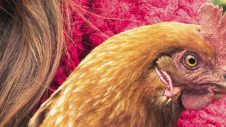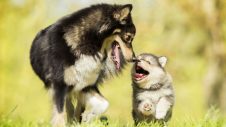Winter can be a time that makes us all feel under the weather. Like us, our pets also notice the cold. Here is what to look out for with your pet in winter.
Arthritis
 Dr Adam Sternberg, Regional Clinical Director – NSW and ACT of Greencross Vets, warns about the effects of the cold on arthritis sufferers. “As with humans, the cold weather can make arthritis symptoms worse,” says Dr Adam Sternberg. “The first thing to look out for is a decrease in activity levels that could be due to the discomfort and pain from arthritic joints,” he says. Book a health check with your local Greencross Vets if you’re concerned about your pet’s health.
Dr Adam Sternberg, Regional Clinical Director – NSW and ACT of Greencross Vets, warns about the effects of the cold on arthritis sufferers. “As with humans, the cold weather can make arthritis symptoms worse,” says Dr Adam Sternberg. “The first thing to look out for is a decrease in activity levels that could be due to the discomfort and pain from arthritic joints,” he says. Book a health check with your local Greencross Vets if you’re concerned about your pet’s health.
Shelter from the cold
Adequate warmth and shelter are essential in combating the cold weather. Dr Sternberg reminds us, “Ensure your pet has adequate shelter and warmth. It may seem obvious, but double-check that pets can safely shelter themselves from wet weather and wind.” Some very old pets with severe joint disease may not have the capacity to remove themselves from the elements and seek out the shelter you are providing. They need that extra TLC. Have them snug as a bug in a rug inside your home for that extra special comfort.
It’s also worthwhile to give pets warmer, padded bedding and more blankets so they can escape the cold. Know your pet – this is especially important for short-haired dogs that live outside. Breeds such as whippets can feel the cold more than other dogs.
Another option is to purchase a jacket or clothing to keep your pet warm if they feel comfortable wearing them. Also, consider bringing your pet inside at night if they’re older or a short-haired breed.
If you keep your beloved pet in a heated indoor environment, ensure it’s a moist heat (such as gas) instead of a dry heat. You could humidify a heated environment with some extra water bowls, which your pet will appreciate too when they’re keen for a drink.
Winter diet
As we tend to avoid exercise in colder weather, we may forget our pets’ activity needs. Decreased activity without a change in diet may impact your pet’s metabolism. Dr Sternberg thinks, “In wintertime, many people won’t exercise their dogs as much as in the spring or summer with the beautiful weather. If you know your dog will be getting less exercise – even if it means reducing the length or frequency of walks – remember to adjust their diet to avoid winter weight gain.”
The same goes for cats, which can become less inclined to exercise or venture outside in winter. Ensure you’re exercising your cat regularly with playtime, and adjust their diet to align with activity levels.Consult your vet if you’re unsure how to keep your pet’s nutritional needs covered without them gaining weight. Obesity in pets is a serious health issue and often starts in winter. Watch your pet closely and help them eat well and stay active. Talk to your local Greencross Vets if you have concerns about your pet’s health.
Exercising in winter
The cooler weather doesn’t mean our pets won’t enjoy exercise as much. “Most pets are happy to participate in regular exercise routines if they’re enjoying company with their owners,” says Dr Sternberg. “Again, it’s important to be aware that they may be slower than normal, particularly if they’re older or have arthritis. Steady exercise and a good warm-up will reduce injury.”
If your pet is slower than usual or acts “sluggish” or like they’re in pain – all of which can be exacerbated by colder weather – ensure you talk to your local Greencross Vets. By booking a health check at your local Greencross clinic, your vet can advise you about treatment for conditions for arthritis, as well as about diet and exercise for your pet.
Winter grooming routine
During the cooler, wetter months, your dog’s or cat’s grooming is important to maintain. It’s easy to become less vigilant, but in a wintry outdoor environment, your pet can be exposed more frequently to mud, puddles, wet grass, and bushes. This can make them prone to knots, matting, and possibly grass seeds stuck in skin or hair (most commonly in paws, under the tail, ears, armpits, or the groin region). So, if you have a regular routine of brushing, combing or washing your four-legged friend, keep that up, placing an emphasis on helping them to get dry and warm as quickly as possible. If washing your dog, aim for once every 1-2 weeks; use a gentle, soap-free pet shampoo and dry them off quickly with a warm towel. Always use warm water when bathing to ensure your pet’s comfort.
With long-haired breeds, pay particular attention to their undercarriage and other areas that may attract seeds or matting. Even though having a full winter coat is nice, consider clipping, shaving or tidying up your long-haired dog or cat so their grooming is easier to maintain. Don’t forget to trim their nails in wintertime, too. With a long-haired pet, you may not see their nails often, so be sure to check that they are not too long. Some dogs have dew claws, which is a nail located on the inside of their leg; these can grow long because they are not naturally worn down. If your pet’s nails are long, please book in for a nail clip.
Winter coats and jackets
Humans often have a favourite coat or protective jacket. How about your littlest family member? Dogs, even breeds with long coats, will feel the cold in winter, and we recommend providing a waterproof coat, vest, or flannel jacket to keep them warm. Our friends at Petbarn have an extensive range available, and you can even take your pet to the store to try them on. Hi-vis leads, collars or jackets are great for low-light evening walks. There are so many options in the functional fashion space now for dogs (and cats), so make sure they rug up for their winter strolls. If you have a short-haired dog or cat, a hairless breed such as a Chinese Crested dog, or a cat with a sparse coat such as a Cornish Rex, they may feel the cold even more as they don’t have that extra layer of natural protection. Ask your local Greencross Vets if you’d like any further advice for your pet.
The good news in wintertime
There is some good seasonal news for dogs and cats in the cooler months! They tend to have fewer skin or hair problems, like rashes, and less exposure to ticks and other parasites (although they may still have fleas and worms). Your heat-seeking cat will probably give you more lap time and love, too, and your loyal dog will want to share the couch with you, so there can be plenty of family bonding indoors at this time.

 Greencross Vets
Greencross Vets 







